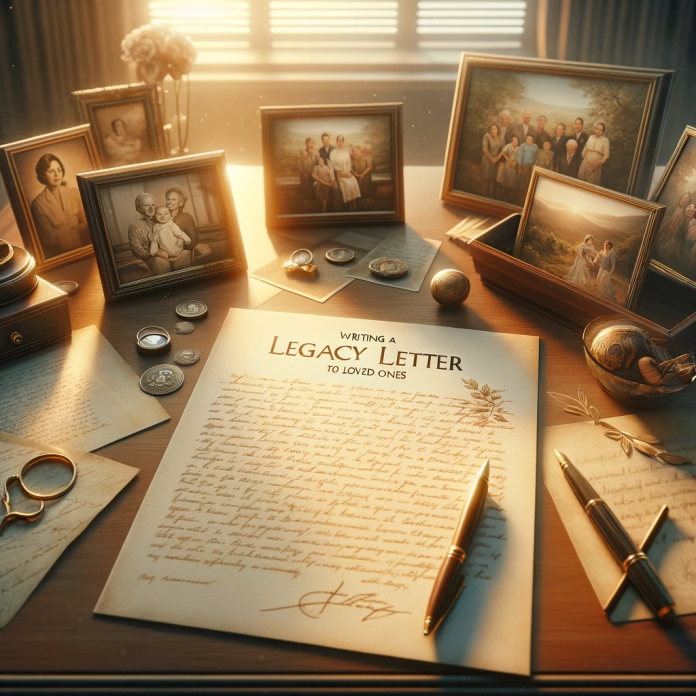A legacy letter, also known as an ethical will, is a heartfelt document that allows you to share your life experiences, wisdom, values, and wishes with your loved ones. It's a way to leave a lasting mark, to pass on your legacy in your own words. This guide will help you understand the process of writing a legacy letter to your loved ones.
Understanding the Purpose of a Legacy Letter
A legacy letter is more than just a document; it's a piece of you that you leave behind. It's not a legal document, but rather a personal one, filled with your thoughts, feelings, and experiences. It's a way for you to share your life's wisdom and values with future generations.
Writing a legacy letter can also be a therapeutic process. It allows you to reflect on your life, your achievements, and your regrets. It's a chance to make peace with your past and express your hopes for the future.
Planning Your Legacy Letter
Before you start writing, it's important to plan what you want to include in your legacy letter. Think about the people you're writing to and what you want them to know. Consider the experiences that have shaped you, the lessons you've learned, and the values you hold dear.
Remember, this is your legacy. It should reflect who you are and what you believe in. It's not about impressing anyone or making yourself look good. It's about sharing your truth with the people you love.
Choosing Your Recipients
While a legacy letter is often written to family members, you can write one to anyone who has had a significant impact on your life. This could be a friend, a mentor, or even a group of people, like a community or organization that you're part of.
When choosing your recipients, think about who would benefit most from your wisdom and experiences. Who would appreciate your words and find comfort or inspiration in them?
Deciding What to Include
Your legacy letter can include anything you want. You might share stories from your life, lessons you've learned, or advice you wish to pass on. You could express your hopes for the future, your regrets, or your gratitude for the people and experiences that have shaped you.
Some people choose to include personal artifacts, like photos or mementos, with their letter. These can add a personal touch and make your letter even more meaningful.
Writing Your Legacy Letter
Once you've planned your letter, it's time to start writing. Don't worry about making it perfect; just write from the heart. Remember, this is a letter to your loved ones, not a formal document. It should be personal and authentic.
Start by addressing your recipients and explaining why you're writing the letter. Then, share your stories, wisdom, and wishes. Be honest and open. This is your chance to express your feelings and share your experiences in your own words.
Sharing Your Stories
Stories are a powerful way to share your experiences and wisdom. They make your letter engaging and relatable. Think about the stories that have shaped you and the lessons they've taught you. Share these stories with your loved ones, so they can learn from your experiences and carry your wisdom forward.
When sharing your stories, be specific and detailed. Use vivid language to bring your experiences to life. This will make your letter more engaging and memorable.
Expressing Your Wishes
Your legacy letter is also a chance to express your wishes for the future. You might share your hopes for your loved ones, your dreams for the world, or your wishes for how your legacy will be carried forward.
When expressing your wishes, be clear and specific. This will help your loved ones understand your hopes and dreams and how they can help fulfill them.
Finalizing Your Legacy Letter
Once you've written your legacy letter, take some time to review it. Make sure it reflects your thoughts, feelings, and experiences accurately. Check for any errors or omissions and make any necessary revisions.
When you're satisfied with your letter, consider how you want to present it. You might choose to handwrite it for a personal touch, or type it for clarity. You could also consider having it professionally printed and bound for a lasting keepsake.
Presenting Your Letter
There are many ways to present your legacy letter. You might choose to give it to your loved ones in person, or you could leave it with a trusted person to be given after your passing. You might also consider reading it aloud to your loved ones, to share your words in your own voice.
However you choose to present your letter, remember that it's a gift. It's a piece of you that you're leaving behind, a lasting legacy of your life's wisdom and experiences.
Conclusion
Writing a legacy letter to your loved ones is a meaningful and rewarding process. It's a chance to reflect on your life, share your wisdom, and leave a lasting legacy. Whether you're writing to your family, friends, or a community that's important to you, your words will be a cherished gift for generations to come.
Recommended Products
- Woodamore Share a Memory Cards — Beautiful 50-pack memory cards for celebrating the life of a loved one at memorials and gatherings.
- Skylight Digital Picture Frame — A touchscreen digital frame that lets family share photos by email — perfect for displaying a slideshow of cherished memories.
- 3D Innovation Crystal Photo — Custom-engraved 3D crystal photo block that beautifully preserves a cherished portrait.


-banner.png)





